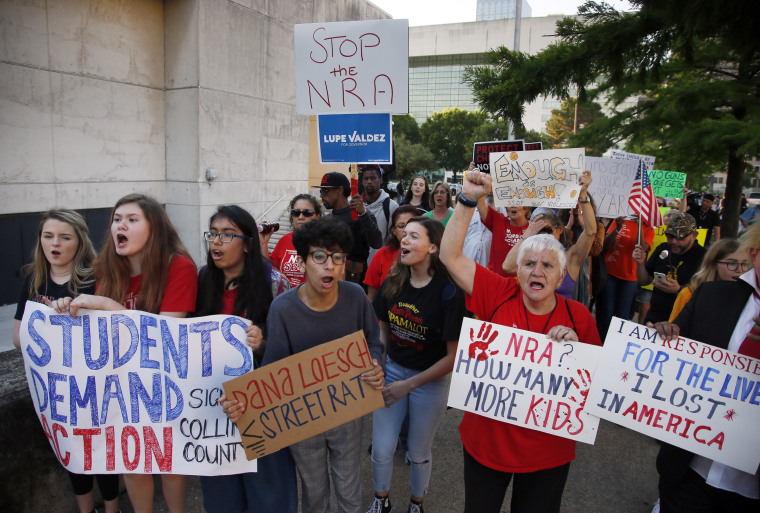Cynics are correct to doubt, despite the epidemic of school shootings around the country, that meaningful gun control policy will be forthcoming, even though over two-thirds of Americans want stricter gun laws. And everyone knows that there are two groups to blame: The NRA, and the politicians caught in its thrall.
To break the NRA’s stranglehold on politics, we have to directly address the attributes that make them so effective. This means democratizing political fundraising to limit the NRA’s financial firepower, and expanding the number of active voters to normalize the impact of NRA members in many districts where candidates are held hostage by the organization.
The NRA has given $40 million directly to both federal and state candidates, parties, and committees over the past 30 years, and spends millions more (at least $54 million in 2016 alone) in independent expenditures to turn the debate around gun control measures so toxic that even the smallest reform becomes politically dangerous.
To break the NRA’s stranglehold on politics, we have to directly address the attributes that make them so effective.
By comparison, gun control groups have only contributed $4.3 million to federal elections since 1989 and spend far less on independent expenditures (a meager $3 million in 2016).
There is little that can be done to limit NRA spending in elections; the Supreme Court has all but forbidden any regulations. We have another option, however: We can raise the financial influence of ordinary Americans to counteract NRA spending through public financing of elections — a Supreme Court-approved policy.
Cities and states across the country have experimented with public financing. New York City developed one of the gold standards in 1988. Now, modest constituent contributions are matched at a rate of 6 to 1. That means a $10 contribution turns into $70, allowing small donors to propel a campaign.
In 2015, Seattle voters approved a first-of-its-kind program that gives every resident four $25 vouchers that can be allocated to eligible municipal candidates. It went into effect for the 2017 election and the number of political donors more than tripled from the 2013 cycle. Many residents who had never given money to campaigns, such as the homeless, gave for the first time and saw their concerns taken seriously by candidates.
Normalizing the outsized influence of gun right voters is just as achievable, through a package of tried-and-true voting right reforms.
Studies have found that candidates in states with full public funding spend less time fundraising and more time talking to their constituents. Public financing also leads to increased diversity among candidates, elected officials, and donors — the latter of which is significant, considering that the current donor pool is overwhelmingly white, wealthy, and male.
Allowing candidates to be financially dependent on their constituents decreases the impact of NRA money and reduces the fear of NRA attack ads. Public financing will also allow more people who care about sensible gun laws to run for office.
Normalizing the outsized influence of gun right voters is just as achievable, through a package of tried-and-true voting right reforms.
The NRA is a mass-membership organization able to galvanize a massive number of voters by spending tens of millions on membership-building every year, making them more politically potent than other special interests with deeper pockets. NRA members are not representative of America as a whole, but their reliable political participation and voting patterns are enough to keep politicians scared.
Mobilizing against NRA-backed politicians will not be enough without simultaneous efforts to push for democracy reform.
Automatic voter registration, a simple streamline to the registration process, is a good place to start chipping away at this outsized influence. In 2016, Oregon became the first state to implement it and the program increased voter turnout by almost 100,000 while also diversifying the electorate. One estimate shows that 27 million Americans would be added to the voter rolls if every state adopted automatic voter registration.
Same-day registration is also extremely effective. By allowing eligible voters to register or update their registration at their polling location on Election Day or during early voting periods, states with same-day registration have had over 10 percent higher voter turnout than those without it.
And to improve lackluster youth participation in elections, we can allow 16- and 17-year-olds to preregister to vote — a simple policy that can boost youth turnout up to 13 percent. (There are also great reasons to consider lowering the voting age.)
Engaging young people is especially transformative, as research shows that, once someone votes, they are more likely to do so again.
To break the NRA’s hold on our government, mobilizing against NRA-backed politicians will not be enough without simultaneous efforts to push for democracy reform. This multi-pronged approach won’t be too hard given that pro-democracy initiatives will be on the ballot across the country in 2018. Voters in Nevada, for example, could pass automatic voter registration, and Floridians will have the chance to end a Jim Crow Era policy that bars approximately 1.5 millions people from voting.
There’s no question: We can have sane gun laws. We just have to fix our democracy first.
Adam Eichen is an Author and Advisor for Equal Citizens.
